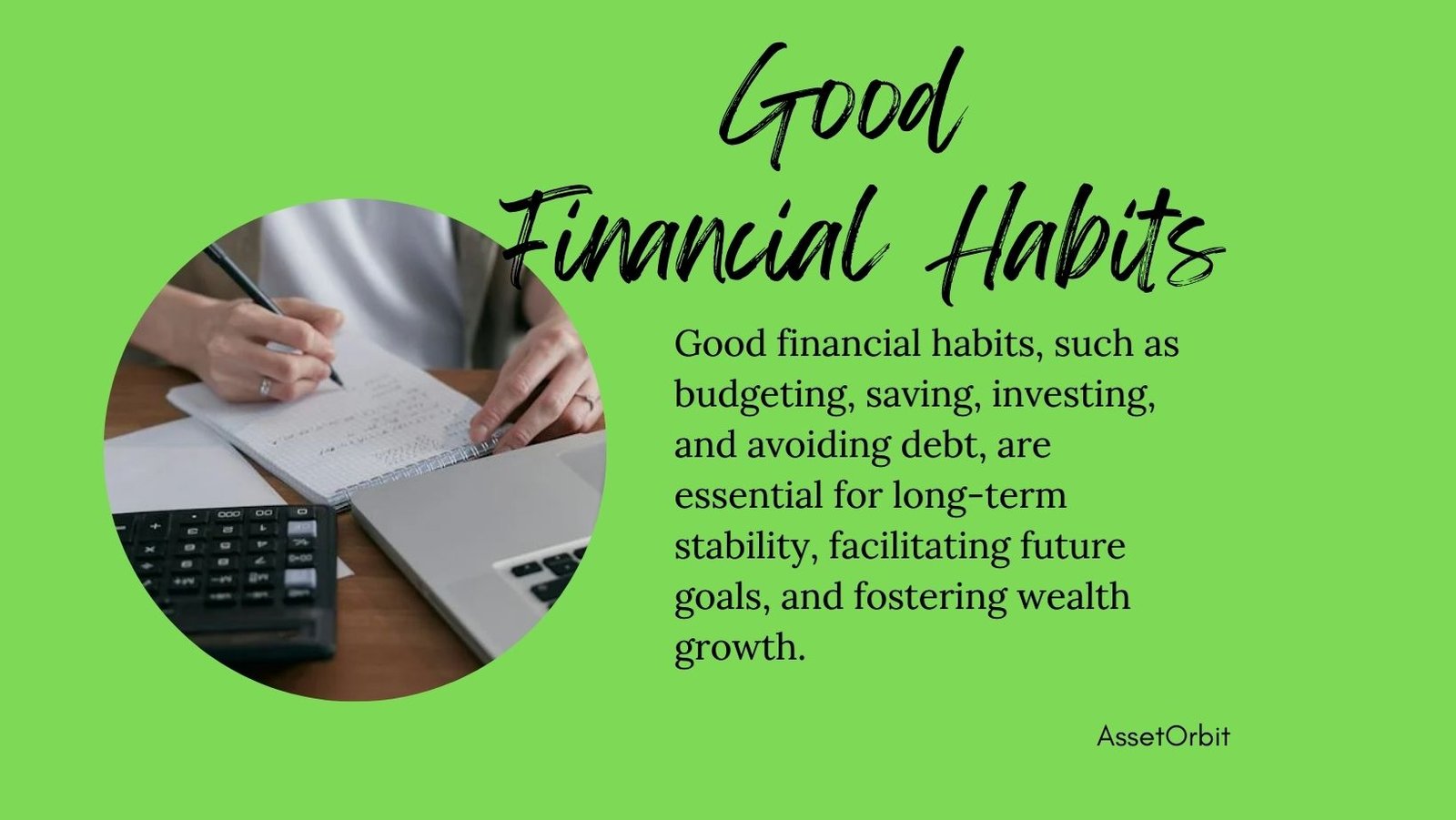What are good financial habits?
Good financial habits involve responsible practices like budgeting, saving, investing, debt management, financial education, setting goals, and regular review. These habits help individuals manage their money effectively, achieve financial stability, and stay informed about personal finance topics and economic trends. Regularly setting realistic goals and reviewing them ensures ongoing success, enhances financial well-being, and creates a secure future.
In short
How essential are good financial habits for college students?
Good financial habits are essential for college students to navigate the financial landscape. Budgeting and building an emergency fund are key strategies to avoid the debt trap and ensure financial stability after graduation. Setting financial goals and learning to invest are like planting money seeds that grow over time. These habits guide students through college, reduce stress, and set them on the path to financial success beyond their campus years.
Good financial habits for college students

1. Create a Budget
Imagine Your Finances as a Puzzle: Imagine your income and expenses as puzzle pieces that make up your financial picture. Making a budget is like putting those puzzle pieces together, providing you with a clear picture of where your money is coming from and moving on.
Your Budget, Your Roadmap: Consider your budget as a personalized monthly route plan. It’s like having a financial GPS that guides you through the costs of tuition, books, rent, and all the exciting (but budgeted) social activities.
Income: Determine all of your revenue sources, including money from part-time employment, allowances, and financial aid. This is the total amount of money you have to work with for the month.
Expenses: Classify Wisely: Divide your spending into needs (such as textbooks and groceries) and non-essentials (such as that extra cup of coffee or internet shopping). This allows you to spend your money wisely while still enjoying a pleasure now and then.
Avoiding Overspending: Imagine your budget as a safeguard, preventing overspending, ensuring funds are not depleted before the end of the month, and aiding in prioritizing what truly matters.
Flexibility and Adjustments: Your budget, like a class schedule, is not set in stone. It’s a versatile instrument that should adapt to new situations. Unexpected costs or additional income? Make the necessary changes to your budget to make it a dynamic and useful financial instrument.
2. Emergency Fund
Emergency Fund Concepts: Imagine your emergency fund as a financial safety net, providing cushioning in case of unexpected financial falls. It acts as a shield against unforeseen challenges, protecting your financial well-being when unexpected expenses arise. It also serves as a tool for financial preparedness, equipping you with the financial means to handle unexpected situations confidently. This financial superhero can help you handle unexpected expenses without disrupting your overall financial stability. Remember, your emergency fund is a vital tool for financial preparedness.
Emergency Fund Goals:: A financial fortress is a plan to save three to six months’ worth of living expenses, providing a robust defense against unexpected hardships. This provides peace of mind, allowing you to sleep better at night knowing you have a financial buffer to handle life’s surprises. An emergency fund is adaptable, allowing you to adjust it based on changes in your life circumstances, providing a reliable shield against unexpected financial villains. It’s like having a superhero adapt to different challenges, providing a financial security blanket for you.
3. Live Within Your Means
A Financial Perspective: Living within your means involves focusing on your income as a canvas for your financial picture, avoiding temptation to overspend, and prioritizing your needs over your wants. This approach ensures a balanced and sustainable financial landscape, avoiding unnecessary expenses and ensuring a stable and secure financial dwelling. By balancing your income, making choices that align with your budget, and prioritizing your needs, you can create a sustainable financial landscape.
Financial Strategies: Informed spending is a crucial financial strategy that involves gathering information, comparing prices, and evaluating purchases to ensure they contribute to financial well-being. Balancing financial capabilities is another strategy, aiming to live within one’s means to maintain financial stability. Living within one’s means fosters financial harmony, allowing for a sense of peace of mind and enjoyment of life without financial stress.
4. Save Regularly
Savings Mindset and Income Allocation: To cultivate a savings mindset, imagine saving as a garden you plant over time, providing security and growth. Align your income with your savings, like a financial garden bed, to ensure they grow into a robust safety net. Each small contribution to your savings creates a financial reservoir, which can be tapped into during unexpected financial droughts, ensuring a steady stream of savings.
Savings as a Financial Safety Net: Saving regularly serves as a financial safety net, shielding you from unexpected financial storms. Time as a savings ally helps grow your savings exponentially over time, transforming them into a robust financial safety net. Regular contributions grow exponentially, making them a flexible investment. Savings provide financial growth and flexibility, offering options and peace of mind in the face of life’s uncertainties.
5. Limit Student Loans
Student Loans as Educational Tools: Student loans can serve as educational tools, but it’s crucial not to over-engineer them. Instead, explore grants and scholarships as financial treasures to ease your educational journey without accumulating debt. Borrowing mindfully ensures you only take what you need, like packing essentials for a journey, and avoids unnecessary financial baggage after graduation.
Repayment Plan Overview: The repayment plan serves as a financial roadmap for post-graduation, guiding students through the process of settling their educational debt. Financial awareness is crucial to avoid excessive burdens and protect against financial stress. Balancing educational investment requires borrowing only what’s necessary, ensuring the investment aligns with future financial goals. By understanding repayment terms and borrowing limits, students can effectively manage their financial burdens.
6. Part-Time Employment
Part-Time Work and Internships: Part-time work can serve as a skill-building workshop, providing valuable experience and honing skills beyond college. It can also serve as a financial booster, providing an extra layer of financial safety net for unexpected expenses or saving for future goals. Internships can be seen as career stepping stones, offering practical insights and real-world experiences and facilitating a smooth transition from student life to the professional world.
Balancing: Balancing part-time work and studies is a delicate task that requires careful planning and ensuring work commitments don’t interfere with academic goals. Time management is a key skill learned from juggling work and studies, which can be beneficial in both academic and professional pursuits. Part-time work also serves as a learning ground, providing insights into the working world and building a foundation for future careers.
7. Use Credit Wisely
Credit Card Use and Responsibility: Credit cards are a valuable financial tool that can offer convenience, build credit, and provide benefits when used responsibly. However, they require attention and responsibility, like driving a car. Paying bills on time is crucial for maintaining a healthy financial vehicle, as it not only keeps your credit score in good shape but also prevents high-interest debt accumulation, ensuring smooth operation.
Credit Card Use as a Financial Foundation: To avoid high-interest debt, use your credit card wisely by avoiding it because it can accumulate rapidly. Recognize and respect your credit card limit as a boundary line, ensuring your spending aligns with your financial capacity and goals. Building a positive credit history opens doors to better financial opportunities, such as lower loan interest rates and increased approval chances for rentals or mortgages.
8. Financial Literacy
Financial Education Importance: Financial education empowers individuals to control their financial destiny, unlocking secrets for a secure future. Understanding interest rates serves as a financial GPS, guiding decisions on loans and investments. Investment knowledge is like a magic wand, transforming the financial landscape over time. These skills enable individuals to make their money work for them, ensuring a successful and secure financial future.
Financial Report Card and Literacy: Credit scores serve as a financial report card, revealing financial behavior. Financial literacy, including budgeting, savings, and investments, guides informed decisions. Continuous learning is essential for financial growth, adapting to changing economic landscapes, and making strategic decisions. Financial empowerment is a lifelong skill that enables confident and successful navigation of the complex world of personal finance.
9. Set Financial Goals
Financial Roadmap: Goal-setting serves as a financial roadmap, providing direction and purpose for financial decisions. It involves setting short-term goals as milestones and aiming for long-term goals like home ownership or education funding. Clear financial objectives guide decisions, align with aspirations and values, and serve as a reliable financial compass.
Achievement Celebrations: Financial goals serve as motivational anchors, keeping you grounded and focused. They can be adjusted based on changing circumstances, ensuring your financial roadmap remains relevant. Achievement celebrations mark progress and motivate you to tackle the next set of financial goals, ensuring a flexible and achievable financial roadmap.
10. Review and Adjust
Budget Review Overview: Reviewing your budget is a regular financial health checkup, ensuring balance in income, expenses, and savings. It’s a course correction for your financial goals, demonstrating financial agility. Adjusting your budget and goals demonstrates resilience and effectiveness. Adaptability in response to changes, such as job changes or unexpected expenses, allows you to navigate without financial stress.
Financial Management: Proactive financial management involves steering a ship through regular reviews and adjustments. Life circumstances are considered financial variables, and regular reviews help identify and adapt them. A financial wellness check is a routine for celebrating successes, learning from challenges, and refining strategies for continued success.
Final thoughts
College students should adopt good financial habits to navigate academic life and maintain a vibrant social life. Budgeting helps balance educational expenses with social life, while emergency funds provide financial support during unexpected challenges. Steering clear of unnecessary debt is crucial for post-graduation financial freedom. These habits are not just financial tools but lifelong companions, empowering students to navigate personal finance and turn aspirations into achievable goals. By embracing these habits, college students can embark on a journey towards financial independence, equipped with the skills and mindset for a prosperous future beyond campus walls.
FAQ
How do you develop good financial habits?
Developing good financial habits is akin to building a solid foundation for a secure future. It involves creating a budget, tracking income and expenses, and regularly saving. Avoid unnecessary debt and view it as a step towards financial goals. Educate yourself on personal finance to make informed decisions. Regularly review and adjust your financial plan to adapt to life’s changes. Developing good financial habits is a marathon, not a sprint. With consistent effort, you can achieve financial success and peace of mind. Remember, it’s not a sprint but a marathon, and with consistent effort, you’ll be on the right path.



